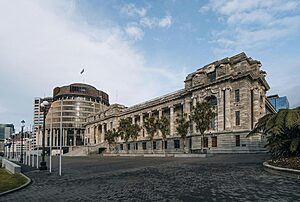In brief
- NZ’s over-ambitious climate policies are pitched as virtuous but anything extra we do, more than an ”average” country, has essentially no global impact.
- Media amplify alarmism, which government uses to justify centralising power, restricting freedoms, and pushing for economic control.
- Like with so many things done in the name of ideology, NZ’s economy and the cost of living are collateral damage.
Nasty weather is exploited for the climate change sales job
The New Zealand Government is perhaps using fear more than most, with the media in full support. Recent weather events provided timely reminders that weather is sometimes destructive. This was immediately and unequivocally connected to climate change, despite broader research showing the evidence was not very solid, when challenged. The Government jumped into action, using the devastation from these events to remind other western nations how much this country is going to do for the climate.

New Zealand’s desire to over-achieve on climate goals seems more like virtue signals designed to look good in front of other western socialist nations (and foolish to many others). Maybe it is just for the personal good of the politician as opposed to the country? There is no real global impact on the climate, but potential negative impacts on New Zealanders.
What can NZ really do?
Our nation’s small population has a very limited impact on global CO2 levels. For every 1 Kiwi there are around 1,500 people elsewhere in the world. Rightly or wrongly, there seems to be general consensus in NZ to doing our part, but having a meaningful impact by doing more is impossible. Yet few in politics can resist using climate change hyperbole to try.
There is a big focus on emissions from agriculture. Climate alarmists are set on reducing New Zealand’s productive output in the sector, with little thought to the greater economic impacts on rural NZ.
These trade offs are seldom fully understood and seem mostly ignored by those in government. Reducing our productivity would have a direct impact on the livelihoods of those working in the sector, and those supporting the industry; the transport sector for example.
Negative ecological and sociological side effects of green energy, like slavery for example, seem inconsistent to the intended virtue being expressed by the government and media. But, hey, out of sight, out of mind.
Handouts for some and limits for others
Climate change is used to push handouts for people buying electric vehicles or extra taxes for buying petroleum powered vehicles. And there are numerous other interventions. The predicted dire consequences are even used to support arguments for less children.
Media stoking climate change fears
Climate change has undeniably been framed by the media and government as a prominent and urgent global concern.
Alarmist language, vivid imagery of impending catastrophes, and sensationalised predictions (very often incorrect) dominate media coverage. Imagery has been leveraged, as it has been with other crises, to draw our focus and stimulate fear. By stoking fear policymakers can garner support for measures that may not otherwise gain widespread approval.
Climate agenda now fully integrated into politics in many countries
To governments, anything that can be presented as an existential threat will always require swift, top-down solutions, sidelining open and nuanced debate or solutions outside of the state.
The issue of climate change is no different. Increased regulation on the individual and greater control of the economy is a certainty. Much like other agendas throughout history, fear of ecological disaster is exploited to justify policies that result in centralization of power, increased taxation, and restrictions on individual freedoms. A “green road to serfdom”.



















